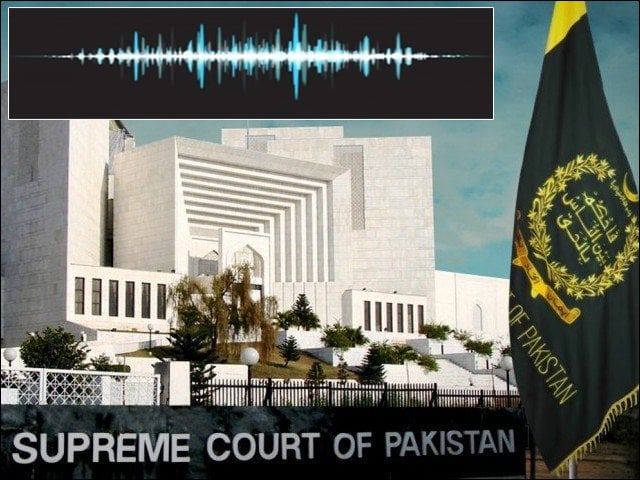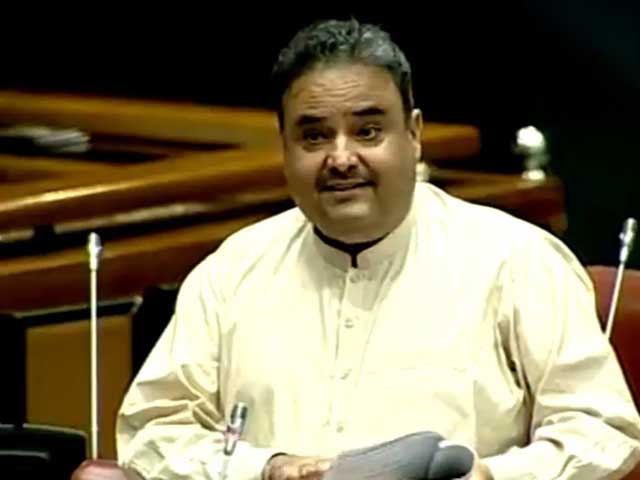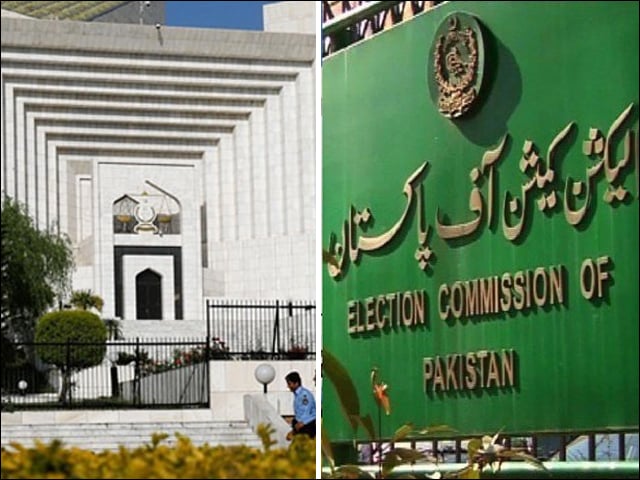Islamabad: The Chief Justice of Pakistan has remarked during the hearing of petitions against the Audio Leaks Commission that the government tried to create differences among the judges.
A 5-member bench of the Supreme Court headed by the Chief Justice of Pakistan heard the petitions against the commission of inquiry set up by the federal government on the alleged audio leaks. The larger bench includes Justice Ijaz-ul-Ahsan, Justice Muneeb Akhtar, Justice Shahid Waheed and Justice Hasan Azhar Rizvi.
Also read this news: The Chief Justice constituted a larger bench on the petitions against the Audio Leak Commission
Attorney General Usman Mansoor came to the rostrum as soon as the hearing on the petitions filed by Chairman PTI Imran Khan, President Supreme Court Bar Association Abid Zuberi, Riyaz Hanif Rahi and Muqtadar Shabbir started and raised objection to the formation of a larger bench. gave
The Chief Justice remarked during the hearing that the government cannot seat a judge on the bench as per its wish. We had asked the question that it is written in 184B that there should be a bench of at least 5 judges. If you had consulted us, we would have told you. The benefit of the May 9 incident was that the rhetoric against the judiciary ended. After the May 9 tragedy, the rhetoric against the judiciary stopped.
The Chief Justice while talking to the Attorney General said that you should not interfere in our administrative authority. We have full respect for the government. Judiciary is the guardian of fundamental human rights. The government hastily enacted legislation to regulate the powers of the Chief Justice. If the government had consulted us, they would have shown a better way. You also made bail and family cases a part of this legislation.
During the hearing, the federal government raised an objection to the inclusion of the Chief Justice in the bench. The Attorney General while arguing said that he wants to draw the court’s attention to Clause 6.
The Chief Justice remarked that the forum for nomination of judges for the commission is that of the Chief Justice of Pakistan. It is not necessary for the Chief Justice to nominate himself to the commission. Neither the Chief Justice is bound by the choice of the federal government.
The Attorney General said that I have instructions from the federal government.
The Chief Justice remarked how the government can select Supreme Court judges for its own purposes. Mr. Attorney General, it is a matter of independence of judiciary. Enough is enough, Mr. Attorney General, please sit down. Request the federal government to respect the constitutional traditions. The forum for nomination of Supreme Court Judge is only Chief Justice of Pakistan.
The Attorney General said that the matter could be clarified, on which the Chief Justice said that the federal government should take care of the quarters in the affairs of the judiciary. The government itself nominated the judges in the inquiry commission. In earlier 3 notifications, the government proposed judges, which were later withdrawn.
The Attorney General said that the 2017 Act was not challenged, to which the Chief Justice remarked that the 1956 Act speaks of respect for the Constitution. We will come to this point later. The Attorney General said that he was ready on this point, to which the Chief Justice remarked that he was sorry the government had tried to create differences among the judges.
The Chief Justice remarked that in the law related to Supreme Court powers, the government asked to form a bench of 5 judges. In the new law, they asked to make a bench larger than 5 for appeal. We lack the number of judges. The government hastily legislated the Judiciary. The government must make the law but consult. Let the government tell whom it consulted while enacting legislation regarding the Supreme Court. If you consult us, you would definitely give advice.
The Attorney General said that all these issues can be resolved, on which the Chief Justice said that if the government resolves the issues, we will also provide relief. If there is interference in the administrative affairs of the Supreme Court without asking, it will happen. We understand that you are the lawyer of the Government of Pakistan. All institutions should get full respect. Constitution talks about distribution of powers. Judiciary is not a part of federal government, we are talking about constitution not ego.
The Chief Justice said that not everything is given openly in the law. Constitution has to be followed according to its spirit. Article 175 cannot be ignored in any case.
The Attorney General told the court that the government did not try to divide the judiciary, to which the Chief Justice said that even if the government did not, it must have happened. The plea of the full court itself is against the Judiciary Reforms Bill. The Attorney General is a sophisticated man, respects you and the government. Now everyone is realizing that respect for institutions is important.
The Chief Justice inquired as to whose advice the Judicial Reforms Bill was brought. The government had sent every case including the family to the committee.
The Attorney General said that the full court was also requested in the Judiciary Reforms Bill.
After the arguments of the Attorney General were completed, Shoaib Shaheen, the lawyer of President Supreme Court Bar Association, Abid Zuberi, started the arguments and referred to the old decisions of the Supreme Court. The counsel told the court that the Chief Justice must be consulted before appointing any serving judge to the commission. Consultation is also necessary before appointing a private person to the commission as it has to take judicial action.
Lawyer Shoaib Shaheen further said that phone tapping itself is an unconstitutional process. It is not written anywhere in the code of inquiry commission as to who tapped the phones. The government is giving the impression that the process of phone tapping is valid. The government should admit that one of our agencies did the phone tapping.
The Chief Justice remarked that there is a Benazir Bhutto government case on phone tapping. Justice Qazi Faiz Isa has also set the rules in the case. The Chief Justice inquired that which judge violated the code of conduct, who will determine it?
Shoaib Shaheen argued that this authority belongs to the Supreme Judicial Council under Article 209. The power of the Judicial Council was given to the Commission of Inquiry.
Justice Muneeb Akhtar said that the tapping of telephone conversation is illegal. It is also against human dignity under Article 14. The independence of the judiciary is also a question in this case. The government is declaring audio leaks as legal. What is the importance of the government’s position in the presence of court decisions? According to the government, if the audios are correct, then what is the purpose of creating a commission?
Lawyer Shoaib Shaheen told the court that the Islamabad High Court has declared that audios and videos cannot be broadcast without verification. The decision of the Islamabad High Court is not being implemented. The High Court has also banned the broadcasting of espionage-based content. No one cares about the verification of audios. Audio leaks, media broadcasts and ministers hold press conferences.
The lawyer said that the commission has notified the whole of Pakistan that whoever has the material can submit it. No legal procedure was followed.
The Chief Justice said that he said that the establishment of the commission is also a violation of Article 209, to which the lawyer replied that the Supreme Court has given judgments in the case of Ifthar Chaudhry and Justice Qazi Faiz Isa. Justice Muneeb Akhtar said that Article 209 allows the executive to send a presidential reference to the Supreme Judicial Council. Apparently, the federal government has committed misconduct by collecting material against the serving judges of the Supreme Court. The federal government has violated the separation of powers in the constitution.
The Chief Justice said that the inquiry commission seems to have done everything quickly. Justice Muneeb Akhtar said that how judges can become a part of the commission by their own will. With the permission of the Chief Justice, proceedings against any judge of the High Judiciary can be taken in any forum other than the Judicial Council. Trying to cover by using sweet words. Apparently, the constitutional principle of separation of powers has been seriously violated. This is a very disturbing situation. While the audio was being played, the said government or PEMRA did not issue any directive to stop it.
Lawyer Shoaib Shaheen said that PEMRA did not take any action on it. The government also did not investigate PEMRA. The Attorney General said that he agreed with the court to the extent of PEMRA.
Justice Muneeb Akhtar said that in hindsight it seems that the powers of the Supreme Judicial Council have been given to the Commission. How can the power of misconduct be transferred from the council to the judges? Although this authority cannot be given to them even with the consent of the judges.
The Chief Justice said that there are some mistakes in the notification. Distribution of Powers The powers of the Council are given in Article 209 of the Constitution. The work of our investigative agencies has been handed over to the Commission. The government should decide whether the audios are genuine or fake. If the audios were known to be real, then the forum would have existed. 30, 33 years of judicial independence journey cannot be abandoned. The court takes the independence of the judiciary very seriously. Judiciary has moral authority. We have the authority of justice. We exercise our authority by public hearing.
The Attorney General said that there would have been difficulties if any other agency was given the authority to investigate, to which the Chief Justice said that Qazi Faiz Isa had said in the case that the investigation could have been done with the approval of the Cabinet.
Shoaib Shaheen, Abid Zubiri’s lawyer, said that it is a pity that the government and parliament are only weakening the judiciary. People expect justice from the judiciary. Due to the lack of rule of law, the culture of justice is being promoted through jathas. If the eyes are closed to the conspiracy against the judiciary, there will be more destruction. The Commission’s order does not mention how the audio was recorded. The Commission is bound by its TORs. The Commission has issued a notice to the whole of Pakistan on the first meeting. No one knows who made the audios. The proceedings of the commission should be suspended for review of the matter.
Chief Justice Umar Atta Bandyal remarked that according to him, the formation of the commission is also a violation of Article 209. Justice Muneeb Akhtar said that the matter related to which judge can be reviewed by the Judicial Council. Sugar-coded words were used in the commission’s notification for suggestions on the authority of the Judicial Council. Filing a reference is an executive power. The case related to the judge is already pending in the Judicial Council. Apparently, this case is against the constitutional principle of separation of powers. Only the Judicial Council can conduct an inquiry against a judge
The lawyer said that the Commission is bound by its TORs. The Commission cannot look into whether the audio recording is in accordance with the law or not. The Commission is not a court, so its scope is limited.
The Chief Justice remarked that one cannot deviate from the constitutional principle of separation of powers. It is not possible to establish any commission without the Supreme Judicial Council. It seems that the government made the commission in haste. Things done in haste often go wrong. The matter of Article 209 is also of great importance.
Later, the Supreme Court reserved the decision after completion of the hearing. The Chief Justice remarked that a short interim order would be issued.
It may be noted that the judicial commission set up by the government to investigate the alleged audio leaks held its first meeting on Monday while its next meeting has been called for Saturday morning at 10 am at the Supreme Court building. Meanwhile, the Chief Justice of Pakistan had constituted a 5-member larger bench of the Supreme Court on the petitions against the Audio Leaks Commission.
(function(d, s, id){
var js, fjs = d.getElementsByTagName(s)[0];
if (d.getElementById(id)) {return;}
js = d.createElement(s); js.id = id;
js.src = “//connect.facebook.net/en_US/sdk.js#xfbml=1&version=v2.3&appId=770767426360150”;
fjs.parentNode.insertBefore(js, fjs);
}(document, ‘script’, ‘facebook-jssdk’));
(function(d, s, id) {
var js, fjs = d.getElementsByTagName(s)[0];
if (d.getElementById(id)) return;
js = d.createElement(s); js.id = id;
js.src = “//connect.facebook.net/en_GB/sdk.js#xfbml=1&version=v2.7”;
fjs.parentNode.insertBefore(js, fjs);
}(document, ‘script’, ‘facebook-jssdk’));



